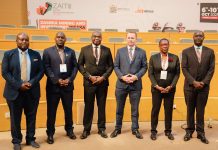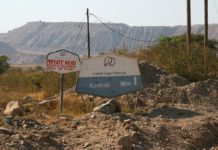Konkola Copper Mines’ (KCM) new Chief Operating Officer, Mark Munroe, believes Zambia is a good mining address, and this is one reason he’s pushing the company into a new, long-term growth phase. It’s happening on the back of $1 billion of fresh investment by parent company Vedanta, the Indian global mining conglomerate headquartered in London.
“The first $200 million has already been released and is being used to stabilise operations, pay off some pressing debts, and fund various Corporate Social Responsibility projects,” says Munroe. “It’s also being used to kickstart a number of new mining projects, some of which have been in the pipeline for a number of years. There’s a new emphasis on growth, and it is being supported at the highest levels within Vedanta.”
Munroe, a mining engineer with a degree in International Economics, has more than 15 years of experience in deep-level mining. It also includes experience in turning around mines that are not working optimally, and making them profitable.
Munroe says he was brought in specifically by Vedanta, whom he says were “looking to ensure that we realise the full potential of this phenomenal ore body” – which is a diplomatic way of saying that KCM needs to mine more copper, more efficiently and more profitably.
Zambia is a good address for mining, says KCM’s new Chief Operating Officer
At the heart of this strategic vision is what KCM calls its Dry Mine Project, which involves de-watering the company’s underground operations, opening up the ore body to expose more mineable ore, and ramping up annual production from 1.5 million tonnes of ore currently to 6 million tonnes over a period of 4 to 5 years.
The de-watering is critical as Konkola Deep’s number 4 shaft is arguably the world’s wettest mine, with up to 450 million litres of underground water being pumped to the surface every day to prevent the mine from flooding. Munroe says the de-watering process itself is not complex – it’s more a question of doing it efficiently, with modern technology and by controlling the extensive power costs necessary to run the pumps and associated machinery.
“The electricity needed to de-water the mine is the single-biggest element of our power costs,” he says. “We are even de-watering parts of nearby Lubambe Mine.” KCM is alone among Zambian mines with this unusual demand on its mining operations, Munroe says.
Munroe welcomes the general improvement in the availability of power, but says Zambian domestic and industrial users would benefit from a more competitive power sector. “This applies not just to Zambia, but to southern African countries in general – the power sector needs to be opened up to more competition so that power can be produced and distributed more efficiently and cost-effectively; it’s not just about tariffs.”
Munroe is more positive on the general issue of mining tax. He suggests that while there is always room for improvement, the government has more or less got it right. “By and large, the tax is fair. Zambia hasn’t gone out and killed the goose that lays the golden eggs.”

That said, he suggests that there might be a case for governments to allow mines to do certain development work – like roads and infrastructure – in exchange for tax relief. That’s because mines have the expertise and the capital to get the work done quickly and cost-effectively. “In South Africa, for example, they’ve found that a mine can build a school for half of what it would cost the government to do it,” says Munroe.
The use of international mining expertise is another strategic issue that KCM faces, though figures suggest it is managing quite well in terms of numbers. Munroe says KCM has barely 40 expatriates out of an employee base of around 6 500 (excluding contractors) – that’s not even 1%. However, he says Zambia should be a lot more welcoming towards expatriates because of the contribution they make. He says this was a subject that Vedanta chairman, Anil Agarwal, raised with State President Edgar Lungu during his visit to Zambia earlier this year. “Any country that wants to develop should make maximum use of the best expertise available in the world,” he says. “Without open borders, there are no skills to transfer.”
Despite the challenges already referred to, Munroe says Zambia has a lot of positives going for it. “Zambia is a good address for mining. The workforce is willing and able. The general level of infrastructure is better than in some neighbouring countries. You can fly here or drive here. It is safe. There are no killings or kidnaps.”
He adds that Zambia can benefit economically from all the mineral resources in the region – including in mineral-rich Democratic Republic of Congo – if it plays its cards right. “It’s about creating the right incentives so that the Copperbelt becomes a mining hub for the region, attracting mining companies, suppliers and consultants to set up businesses there,” he says.
Mining is a long-term business, and the next few years will show to what extent KCM’s new expansion drive will achieve its objectives.
See also: Diesel fuel from trees


























